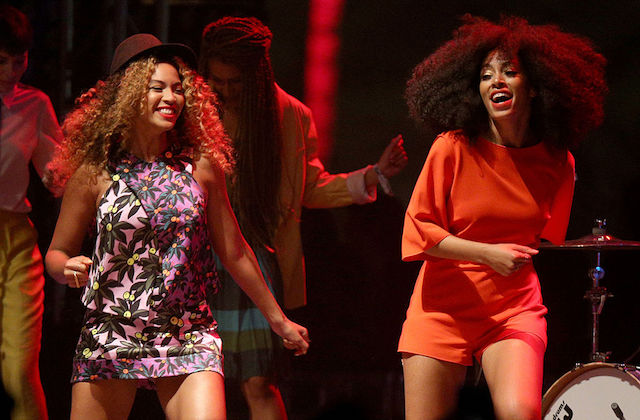Last year was a banner one for both Beyoncé and Solange, as the Houston-bred sisters both released critically-acclaimed albums, “Lemonade” and “A Seat at the Table,” respectively. In a Q&A published by Interview magazine today (January 10), big sister Bey chats with Solange about her work. Here, three excepts you don’t want to miss.
On owning her own voice:
Beyoncé: You write your own lyrics, you co-produce your own tracks, you write your own treatments for your videos, you stage all of your performances, all of the choreography…. Where does the inspiration come from?
Solange: It varies…. But I do have—and I’m unafraid to say it—a very distinctive, clear vision of how I want to present myself and my body and my voice and my perspective. And who better to really tell that story than yourself? For this record specifically, it really started with wanting to unravel some truths and some untruths. There were things that had been weighing heavy on me for quite some time. And I went into this hole, trying to work through some of these things so that I could be a better me and be a better mom to Julez and be a better wife and a better friend and a better sister. Which is a huge part of why I wanted you to interview me for this piece. Because the album really feels like storytelling for us all and our family and our lineage. And having mom and dad speak on the album, it felt right that, as a family, this closed the chapter of our stories. And my friends’ stories—every day, we’re texting about some of the micro-aggressions we experience, and that voice can be heard on the record, too. The inspiration for this record came from all of our voices as a collective, and wanting to look at it and explore it. I’m so happy I got to take my time in that process. And the end result feels really rewarding.
On her favorite thing about the album’s reception:
Beyoncé: I was with you the week leading up to your release, and it’s the most nervous time for any artist, but I know it was a nervous time for you.
Solange: Yeah. I was breaking out into hives. I could not sit still. It was terrifying. This was going to be such an intimate, up-close, staring-you-right-in-the-face experience, the way people would see me and hear me. It was one thing to make the record and have those reservations; it was another to finish it and actually share it. I just feel so much joy and gratitude that people have connected to it in this way. The biggest reward that I could ever get is seeing women, especially Black women, talk about what this album has done, the solace it has given them.
On why she chose to sing in her falsetto voice on many of the album’s tracks:
Beyoncé: Your voice on the album, the tone of your voice, the vulnerability in your voice and in your arrangements, the sweetness and the honesty and purity in your voice—what inspired you to sing in that tone?
Solange: It was very intentional that I sang as a woman who was very in control, a woman who could have this conversation without yelling and screaming, because I still often feel that when Black women try to have these conversations, we are not portrayed as in control, emotionally intact women, capable of having the hard conversations without losing that control. I had not really explored my falsetto as much on previous works. As you said, I have always loved Minnie Riperton, and I loved Syreeta Wright and really identified with a few of her songs that she and Stevie Wonder did. She was saying some really tough shit, but the tone of her voice was so sweet that you could actually hear her more clearly. I wanted to find a happy medium, feeling like I was being direct and clear, but also knowing that this was a conversation that I was very much in control of—able to have that moment, to exist in it, to live in it and ponder it, not to yell and scream and fight my way through it—I was doing enough of that in my life, so I wanted to make a clear distinction of me controlling that narrative. Aaliyah was also a huge influence and has always been. Her vocal arrangements with Static Major are some of my favorite in the world.
Read the full interview here.
